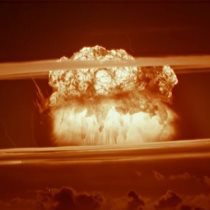
Dr. Karl-Heinz Kamp, President of the Federal Academy for Security Policy. Picture: private
Last Friday the regime of North Korea announced it conducted its fifth nuclear test. What happened and what dangers will arise?
Karl-Heinz Kamp: Based on the registered seismic data, the underground detonations could have had a magnitude in the range of 20 to 30 kilotons. That would be significantly greater than the last test, which apparently ranged between seven and nine kilotons. But these are only rough estimates that depend on geological circumstances as well as the technical arrangement of the test. We know comparatively little about all of this. It is also unclear whether North Korea possesses functional nuclear weapons, and if yes, how many. Next to the danger of North Korea’s direct use of nuclear weapons, the problem of nuclear proliferation further remains. U.S. presidential candidate Trump said that American security promises to allied nations do not interest him very much. In his opinion Japan and South Korea should build their own atomic weapons. This is exactly what both countries will do if they feel threatened by North Korea and can no longer count on credible American protection.
Why is no action taken against the plot of Pyongyang? The Iraq war was once declared based on the suspicion of the construction of nuclear weapons.
North Korea is often labelled as a “zombie regime” that apparently never dies. As perverse as it sounds: for most states involved an existent regime in North Korea is still better than a crumbled regime. If a coup happened tomorrow – whether initiated by domestic pressure or induced from abroad – total chaos would arise in a country with completely traumatized citizens who were slaved and isolated for decades. In this case South Korea would be confronted by massive migration movements. The U.S. would take care of the remaining nuclear material and possible nuclear weapons that could fall into the hands of terrorists. China especially fears that a Korean reunification is only realizable under South Korea’s predominance. As a close ally to the United States, South Korea could thus further expand itself and increase the American influence in the region. Yet at the same time the nuclear power China is the protector of North Korea. Therefore, North Korea is relatively safe from foreign interventions because no one – not even the U.S. or Russia as the largest nuclear powers – attacks a nation that either possesses nuclear weapons itself or is allied with a nuclear power.

Castle Bravo detonation on March 1, 1954. Picture: U.S. Government (1954)
As the only country that can influence Kim Jong-un, why does China not act but rather lets itself be played by North Korea?
China would indeed have the possibility to pressure North Korea. Beijing could simply turn off the electricity or stop delivering exports to North Korea. Without China’s help North Korea is not fit for survival. De facto China exhibits double standards: It criticizes North Korean nuclear and missile tests, but at the same time allows the export of technical appliances that North Korea needs for its missile programs – such as vacuum pumps or uranium hexafluoride. China is obviously angered by Seoul and Washington’s announcement in July that an American missile defence system is to be installed in South Korea. Hence, Beijing apparently regards the U.S. and South Korea as greater dangers than North Korea. However, at great expenses: The People’s Republic, that wants to be perceived as a global power, shows that it cannot even keep a small neighbouring country with an unpredictable leadership under control. Kim Jong-un also knows that he does not have anything to fear from China. The next nuclear test should not be far away.
Interview: Editorial staff
